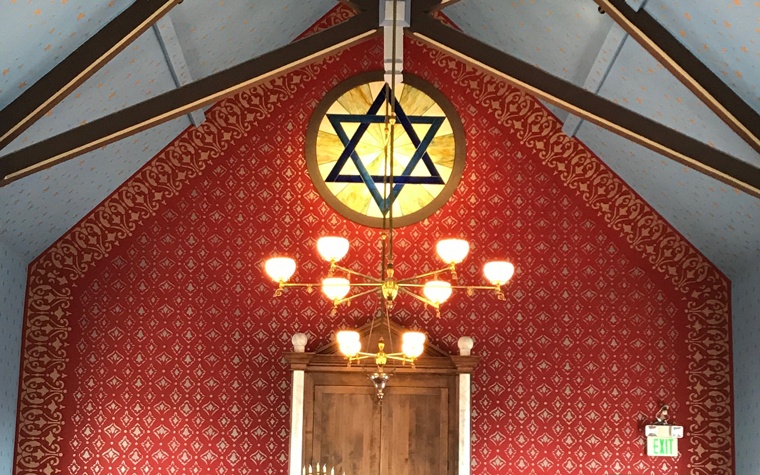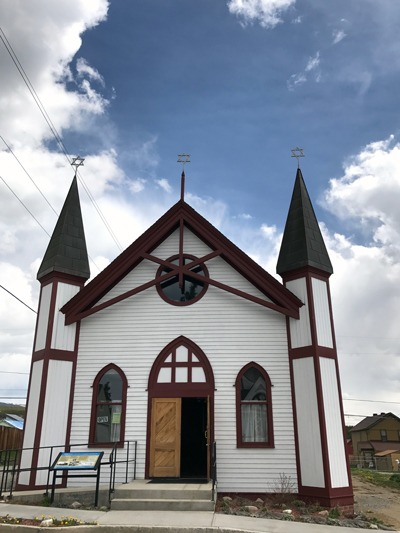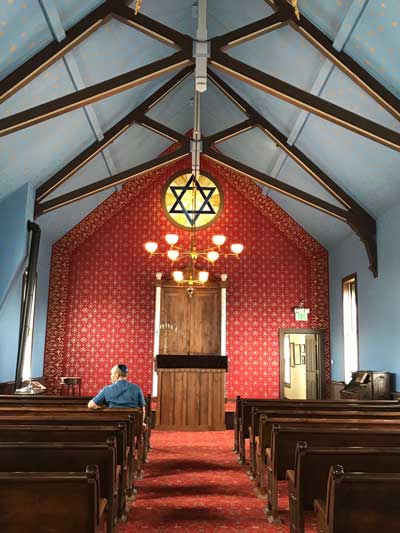On my way to Aspen, Colorado, to attend a Bat Mitzvah, I stop midway to grab a coffee in a funky little town called Leadville. While sipping my freshly roasted brew, I stroll along Leadville’s charming historic district, that looks more like an old western movie set, taking in the breathtaking snow dipped Rocky Mountain tops visible in the distance.
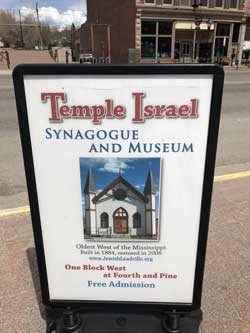 Leadville, also known as Cloud City, for its high elevation (over 10,000 feet), is home to just under 3000 residents. I peek inside the Silver Dollar Saloon, dimly lit, but still serving locals since the silver mining boom of the 1800’s, and then walk further down to the Antique Emporium, in search of yet another chachka to add to my collection. In fact, I am so excited about my purchase (a pair of art deco turquoise glass candlesticks) that I almost miss the white sidewalk sign with a large black arrow pointing to Temple Israel Frontier Synagogue & Museum just down the road.
Leadville, also known as Cloud City, for its high elevation (over 10,000 feet), is home to just under 3000 residents. I peek inside the Silver Dollar Saloon, dimly lit, but still serving locals since the silver mining boom of the 1800’s, and then walk further down to the Antique Emporium, in search of yet another chachka to add to my collection. In fact, I am so excited about my purchase (a pair of art deco turquoise glass candlesticks) that I almost miss the white sidewalk sign with a large black arrow pointing to Temple Israel Frontier Synagogue & Museum just down the road.
Like a kid on a treasure hunt, I follow, walking past lavender and canary yellow painted gingerbread homes, to the corner of 4th and Pine Street. I know that I’ve reached my destination when I make out three iron Stars of David placed symmetrically on the top of synagogue steeples. Once inside, I am overwhelmed with the beauty of this small two-storey structure, built in 1884- it is said to be one of the few remaining pioneer synagogues west of the Mississippi River.
The ceiling and walls, painted a candescent sky blue, are covered with thousands of gold stars. I am amazed. I wander about and discover that the synagogue houses a permanent museum exhibition, Frontier Jewish Leadville. Several glass display cases in the middle of the sanctuary reveal over 80 artifacts from the collection including whiskey jugs, Kiddush decanters, personal letters and Shabbat candlesticks from Hungary.
- The synagogue exterior
- The interior is striking.
I check in with a young man, seated at the entrance, named Matt Hulstine, a history major from the University of Denver who was hired by the Temple Israel Foundation for the year to write biographies about the 300 or so Jews who lived and thrived in Leadville from the mid 1880’s to the 1920’s. Because of the silver boom, Leadville’s population back in those days was over 30,000, so the Jewish residents were a significant bunch. Most were downtown merchants who sold many items including dry goods, whiskey, furniture and clothing. Some even tried their luck at mining.
Detailed biographies and numerous photographs of these interesting Jewish folks can be found on an impressive website (jewishleadville.org) that covers everything from meeting notes of the Hebrew Benevolent Association of Leadville in the early 1800’s, to a special exhibition, “Selling History” that features advertisements placed in the local papers by the Jewish merchants in town.
Some of Leadville’s more notable citizens were Meyer Guggenheim, the patriarch of the famous Guggenheim family, who after immigrating to America from Switzerland in 1847 began building his fortune in silver and lead mining in Leadville. David May, the founder of the May Department Stores Company opened his first store in Leadville during a silver strike.
I also discovered while chatting with Mr. Hulstine that a Hebrew cemetery exists in the southwest corner of the Evergreen cemetery, only a short drive away. I plan to visit immediately after, but I want to know more about the person or group responsible for restoring this unique synagogue and once forgotten cemetery. He hands me a business card- with the Temple Israel Foundation logo written in bold black font, along with a name in small letters below, William Korn.
After I returned from Aspen, I caught up with Bill Korn, President of the Temple Israel Foundation, who now splits his time between Leadville and Boulder. When Korn, a native of New York City, made his way to Colorado back in the 1960’s to volunteer for VISTA, an American national anti-poverty program, he became enthralled with the mountainous state and its people, and returned later after dropping out of grad school to put down roots and start a family. Little did he imagine then that he would one day spend much of his spare time leading an initiative to bring to life the legacy of the pioneer Jews of Leadville.
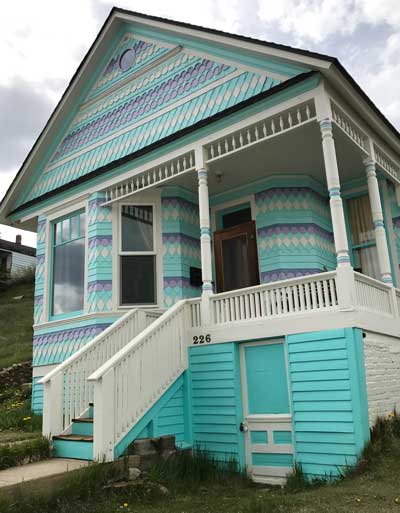
A painted lady in Leadville.
In Boulder, Korn first worked as a mechanic, and then went back to get his MBA in finance and real estate at the University of Colorado. He taught there until the early 1980’s, and then became interested in property investment and maintenance. Korn started to search for business opportunities in nearby Leadville. Prices were low at that time, so Korn bought a second home.
While fixing up his old house, Korn hired a contractor who was Jewish and mentioned that there was a Jewish cemetery in town. “The cemetery was overtaken by the forest, ” Korn recalls. He was also told that there was a synagogue down the street.
“All these discoveries got me thinking about Leadville’s Jewish heritage and what remained, ” he says.
The more Korn looked into the history of the Jews of Leadville, the more interested he became. “ I wanted to do something to mark or commemorate the Jewish community that lived here.”
In 1987, Korn incorporated the Temple Israel Foundation, a small 9- member board of directors including his wife, daughters, aunt, and college buddies. Together, they began the process of acquiring and restoring both the synagogue and cemetery, which they did on a “shoe string” thanks to Korn’s lawyers and accountants who pitched in pro bono.
Technically, the cemetery, which hadn’t been used since the 1920’s, didn’t legally belong to anyone (the Hebrew Benevolent Association acquired the cemetery in 1880). So, in 1993, the Foundation was awarded title to the Hebrew Cemetery by the district court. A local family, however, owned the synagogue at the time, and it had been converted into a four-unit apartment house. It took several years of negotiations with the owner, and the Temple Israel Foundation was able to purchase the synagogue building at a “reasonable price” in 1992.
After receiving a grant from the State Historical Fund, Korn was able to rebuild the original temple’s front façade while tenants still lived there. An electrical fire in 2006, made the building no longer inhabitable. Thanks to an additional grant, Korn and his team were able to restore the entire building. He was finally ready to make his dream of commemorating Jewish life in mid 19th century Leadville a reality.
Korn got significant help from the Denver branch of B’nai B’rith- they initiated an annual cemetery clean- up that has been running for 21 years. According to the Foundation’s records, there were 133 people buried in the cemetery but there are still 13 plots that have not been accounted for. A new section in the cemetery was opened in 2001, in response to numerous requests to buy plots from Jews in Vail and the Leadville vicinity.
“In a sense, the cemetery has come back to life,” says an emotional, Korn.
Some of the descendants of the Leadville Jews have reached out to Korn from time to time, to learn more about their great grandparents, to help with the cemetery clean up or to donate artifacts.
According to Korn, there only 80-100 Jews left now in Leadville, many of whom, are highly assimilated.
In the future, he hopes to complete the biographies for every Jewish person who lived in Leadville, and to create an even more extensive database. Korn is grateful for the ongoing support the Leadville community has given him. The building and cemetery bring tourists to this quiet little town, “which is a good thing,” he says. He remains passionate and committed to keeping the memory of the Leadville Jews alive.
“It is my hope that the synagogue and cemetery will act as living monuments.”
The Temple Israel Museum is open to visitors from May through to October, but appointments are available year round. Admission is Free. The synagogue can also be booked for special events.
> This article by Rena Godfrey also appeared in the Canadian Jewish News.
